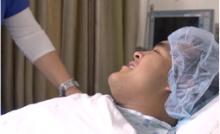 Although hemorrhoids are very common (affecting about three quarters of the U.S. population at some point in their lives), many patients are too embarrassed to seek medical attention. Although our GI specialists and colorectal surgeons at La Peer Health Systems’ Hemorrhoid Center of Excellence don’t want shame to prevent anyone from seeking the medical help, we understand that hemorrhoids can be a sensitive subject for people.
Although hemorrhoids are very common (affecting about three quarters of the U.S. population at some point in their lives), many patients are too embarrassed to seek medical attention. Although our GI specialists and colorectal surgeons at La Peer Health Systems’ Hemorrhoid Center of Excellence don’t want shame to prevent anyone from seeking the medical help, we understand that hemorrhoids can be a sensitive subject for people.
Hemorrhoid FAQs
What are hemorrhoids?
Hemorrhoids occur when blood vessels located in and around the anus and rectum become inflamed and swell. Often, hemorrhoids bleed, leading to pain and discomfort.
How common are hemorrhoids?
Hemorrhoids are quite common, afflicting 75 percent of Americans at some point in their lives.
What are some risk factors for hemorrhoids?
Although anyone can develop them, hemorrhoids are most common in people between the ages of 45 and 65. Hemorrhoids are equally common in men and women, though pregnant women frequently exhibit them.
Truck drivers, bicyclists, or anyone that sits for prolonged periods of time each day is at a high risk of developing hemorrhoids. Diet and lifestyle play also a role in the development of hemorrhoids. People who don’t get enough fiber in their diet may be at a greater risk for hemorrhoids, as constipation can lead to straining in the bathroom. Obesity is also a risk factor, as extra weight puts a greater burden on the vascular system.
Request your consultation today.
Call us at 888.742.2032 to schedule an appointment or:
How do I know if I have hemorrhoids?
The following signs and symptoms may indicate that you are suffering from hemorrhoids:
- Bleeding during bowel movements
- Pain
- Itching
- Irritation in the anal region
- Bump near the anus
How long do hemorrhoids last and can hemorrhoids go away without medical treatment?
In many cases, hemorrhoids will heal on their own or with home treatments, with the amount of time depending on the severity of the hemorrhoids. However, moderate or severe hemorrhoid cases may require medical intervention.
Can hemorrhoids really be prevented?
Making changes to diet and lifestyle can do a great deal to reduce your risk for developing hemorrhoids. If you’re worried about hemorrhoids, you may want to consider altering your diet to include plenty of fruits and veggies and taking a fiber supplement. Exercising regularly is also crucial to both colorectal and overall health. If you sit for prolonged periods of time during the day, make an effort to stand and stretch for a few minutes every hour.
If I’m experiencing rectal bleeding, is it definitely hemorrhoids?
A number of conditions can cause rectal bleeding, including colon cancer. If you’re experiencing persistent rectal bleeding, visit a colorectal surgeon for a consultation and exam.
Are treatments different for internal and external hemorrhoids?
Different treatment methods may be necessary to care for internal hemorrhoids and external hemorrhoids. In many cases, external hemorrhoids can be treated with over-the-counter ointments and medicated pads. However, persistent internal hemorrhoids may require banding ligation or another surgical procedure.
Should I be embarrassed about my hemorrhoids?
No! Hemorrhoids are incredibly common, and you should never be too embarrassed by them or any medical condition to talk to a doctor.
Will my hemorrhoids recur after surgery?
Although hemorrhoidectomy and other treatments are very effective at treating hemorrhoids, there is always a chance that the condition will recur. Our experts may recommend diet and lifestyle changes to help lessen your chance of developing hemorrhoids again.
If I have hemorrhoids, does that mean I’ll develop colon cancer?
No, hemorrhoids are not a sign of colon cancer. However, sometimes people assume their bleeding is caused by hemorrhoids when it actually results from another medical condition. For persistent pain and rectal bleeding, you should make an appointment with a colorectal surgeon to be examined.
If I have a bulge on the outside, is it definitely an external hemorrhoid?
Bulges on the outside of the anus are not necessarily external hemorrhoids. In some cases, internal hemorrhoids may prolapse and resemble external hemorrhoids.
Does insurance cover hemorrhoid removal treatment?
Many insurance plans do cover hemorrhoid treatments. We can contact your provider, if you would like, to find out if you are covered for any procedures.
If I have a colonoscopy, will the doctor notice my hemorrhoids?
Your colorectal surgeon may notice your hemorrhoids during a colonoscopy. However, you should never feel embarrassed about this, as hemorrhoids are incredibly common. In most cases, the presence of hemorrhoids does not cause pain during a colonoscopy, though you may experience some mild bleeding or irritation from hemorrhoids after the procedure.
What is recovery from hemorrhoid surgery like?
Contact the Hemorrhoid Center of Excellence
Although hemorrhoids can be embarrassing, you should never let shame stop you from seeking the medical care you need. The colorectal surgeons at the Hemorrhoid Center of Excellence are committed to providing the best care possible for all medical conditions. Feel free to schedule an appointment today at our Los Angeles facility by calling (888) 742-2032.
Next, read hemorrhoid surgery testimonials from our patients.










